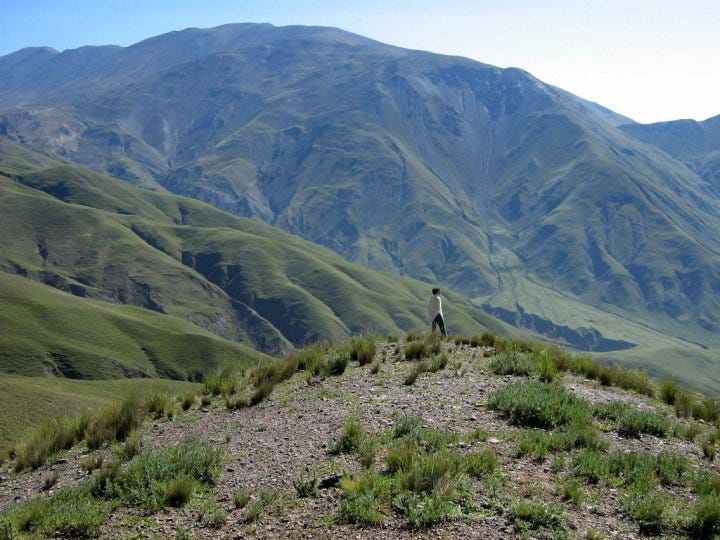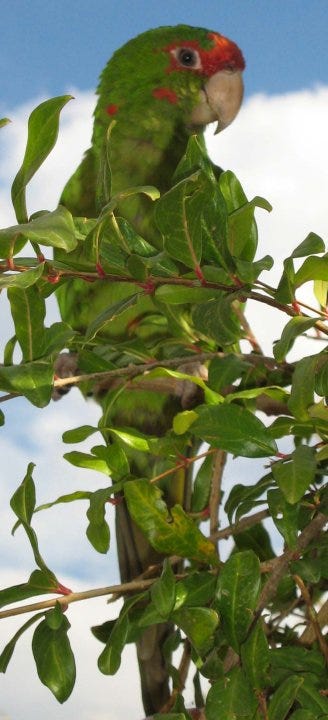Travellers
I’ve always been an extreme physical coward. Downhill skiing and bungee jumping are not for me—in fact, I get a queasy feeling in the pit of my stomach if I have to ride a bicycle down even a fairly gentle slope and my sweaty right hand will be squeezing the brake all the way. Riding on the back of someone’s motorbike was an experience of abject terror that I hope never to repeat. And I’m an emotional coward, too. I can’t deal with in-person conflict: I won’t debate (except in writing); I could never be a politician—if I ever had to face a barrage of hostile questions from insistent journalists I would surely burst into snotty sobs. I remember every single occasion on which a personal friend has expressed anger or disappointment with me and the memories still make my face flush and my heart race.
Yet, people are always telling me that they think I’m brave. What they mean by this, I think, is that I’ve made—and continue to make—life choices that other people feel would put them firmly outside their comfort zone. Some of these choices were almost certainly foolhardy. In my twenties and thirties, I broke up with partners who were handsome, smart and kind, for reasons that I cannot even recall or that seem frivolous now. In my thirties, I left academe without a solid alternative career and scraped together a living with a precarious combination of freelance translation and Argentine tango teaching, in Buenos Aires. Now, in my mid-fifties, I’m making unconventional choices for a different reason—because I’m working with limited options now. Thanks to some of my poor decisions of the past, the easier routes to a secure and comfortable old age are closed off to me. Long shots are now my best shots. So I’m pulling my swimming cap over my hair, snapping my goggles onto my eyes and—ignoring the forecasts of storms and the warnings of rip tides—I’m once again wading out into the breakers. This is my best chance of reaching the calm shallows in which I hope to have my life’s tranquil second swim.
I don’t have real estate or savings or a husband and it’s too late to acquire or amass the first two of those, at least. I travel with hand luggage only these days, literally and figuratively. But I do possess some treasures that can’t be separated from me, that can’t be placed in the dove-grey plastic bins at departures. My body is healthy and my mind is stuffed with memories and fantasies.
In Dan Simmons’ Hyperion Cantos, hundreds of planets thousands of light years apart are linked by a network of mysterious jump gates that allow the inhabitants of his Hegemony to transit between them at will. Some of the wealthiest citizens have houses that span galaxies, each room a different world. My memory palace is like that—and every place I visit is set into sharp relief by its contrast with other countries and cities I’ve known; or enriched by the sweet nostalgia it arouses for similar places, its equivalents one jump gate over.
And every place has its madeleines, its little evocative reminders of experiences in my past. The lime-green parakeets valiantly braving the wintry cold of an East London garden recall the birds that flashed across the skies of Gujarat and the Quaker parrots that perched on power lines, hundreds to a row, above the vineyards of the Andean foothills in Cafayate, flying up into the air in huge clouds at sunset in an explosion of colour that reminds me of the clouds of bright chalk suspended for a moment in the heavy humid air of Pune, grenades of colour fired off for Holi. The crisp bright early morning air of a Sydney August, prickling my skin into goosebumps as I click the dog gate shut and prepare for my run, reminds me of the first snow-free walks in a Minnesota spring and, as I pass the raucous corellas in the gum trees by the bay, for a millisecond their cries make me glance up for monkeys in the branches, for the cheeky little macaques of Kandy, who liked to dive bomb into lotus pools, and the sleek and furry gray langurs, who would claw at my kurta and greedily snatch peanuts from my hands.
Do I regret the choices I’ve made in the past? Absolutely. But also, it is really hard to know how things would have turned out had I made different ones. We accumulate flavour as we age, like a curry cooked without a recipe, with spices tossed freehand into the belly of the kadai—hing and cumin, coriander and mustard seeds jumping in the hot oil, fragrant black cardamom squeezed out of papery husks, fenugreek leaves and amchur, the chalky goldenrod tumeric powder—until the flavours have melded and it is impossible to tell in what order or proportions the individual ingredients were added.
In the eighth of his Letters to a Young Poet, written from Sweden in 1904, Rainer Maria Rilke describes the transformative power of sadness. His correspondent, the nineteen-year-old army cadet Franz Xaver Kappus has been confiding in Rilke about his anxieties and suicidal impulses (Kappus’s letters to Rilke, lost for over a century, were rediscovered among the family papers in 2017). Rilke tells him that when we experience sorrow, it changes us permanently, becoming part of us (and therefore the writer should treasure it, as enriching his store of inspiration). After a great sorrow, he tells Kappus:
the new presence inside us, the presence that has been added, has entered our heart, has gone into its innermost chamber and is no longer even there, is already in our bloodstream. And we don’t know what it was. We could easily be made to believe that nothing happened, and yet we have changed, as a house that a guest has entered changes. We can’t say who has come, perhaps we will never know, but many signs indicate that the future enters us in this way in order to be transformed in us, long before it happens.
I was reminded of Rilke’s image of a room being altered by the arrival of a new occupant recently, while watching the 2017 Netflix show Travellers. The premise of the show is that a group of time travellers are visiting Earth from a dystopian future, in which a terrible disaster has befallen our world, in order to change our present and thereby save theirs. The eponymous travellers inhabit the bodies of present day human beings, taking over at the moment of death. They have only limited choices as to whose bodies they borrow: one of the protagonists must live with a heroin addiction, inherited from his host; another has a newborn infant to look after as she tries to fulfil her mission; many are transported into the bodies of elderly people.
I’ve found this fictional device surprisingly comforting when I find myself slipping into a state of obsessive anxiety and regret. After all, an alien from the future who found herself inside my meat suit would surely feel that she could have done a lot worse. I try to imagine how it would feel to be that alien, to live as she would live—focused on the work yet to be done and feeling no responsibility or guilt for the decisions made in the past, since I wasn’t the one to make them. And this is not just a fanciful thought experiment. In a sense, we are all travellers: our past selves are completely inaccessible. They haunt us in the form of a dodgy knee, a population of lumpy fat cells encircling the upper thighs, a scar across the elbow from a tricycle accident at age five, a craving for the remembered taste of an oaky Chardonnay, a memory of how to walk from Leytonstone to Epping, through marshy flats, along muddy trails, following the track of the forest. But they themselves are long dead. We are the aliens and we have to ride these strange flesh vehicles from here into the future. I haven’t been the most careful owner—but nor is this old banger I’m cruising around in a write-off quite yet.
A poem I wrote a few years ago encapsulates some of my feelings about risk and security. Truco is an Argentine card game with similarities to both bridge and poker. The rules are intricate, but the basic strategy involves working out which gambles may pay off. At this stage in my life, I’m forced to be a gambler. I don’t have a secure fall-back option. But I’m used to the card tables now.
“Truco,” I shouted, though my cards were low,
My bluffer’s heart tap danced like Fred Astaire
I want it! Raise the stakes! Oh yes, I know
The penalties are high—but I don't care!
My adversary’s played this game before
He knows that I don’t have a winning hand
His mind is on the tab; he’s keeping score
He knows the tricks will fall as he has planned.
But I just want to play this one last round,
To feel I’m in the game; I won’t yet fold.
In spite of my poor odds, I’ll stand my ground
And afterwards I’ll say, well, I was bold,
But at least I acted on the things I felt
At least I played the hand that I was dealt.




That was relatable and entertaining.